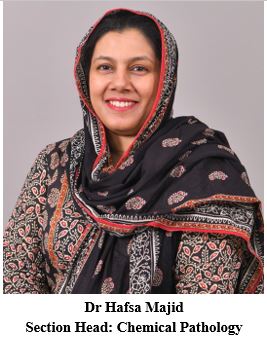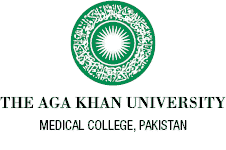Chemical Pathology
Education
Chemical Pathology is a rapidly evolving field of clinical pathology in Pakistan. Faculty in the section are responsible for providing rich experience of teaching and learning to undergraduates, postgraduate and technologists.
section are responsible for providing rich experience of teaching and learning to undergraduates, postgraduate and technologists.
The residency programme in chemical pathology at AKU provides training in both chemical and applied chemical pathology. Residents rotate through medicine and outpatient clinics. In the laboratory, they learn to interpret and report tests relevant to clinical chemistry. The residency programme offers outstanding learning opportunities in a variety of clinical laboratory settings using state-of-the-art techniques, diverse experiences in translational research and hands-on participation in the development and introduction of sophisticated new tests for immediate patient care and diagnostic application. The residents also participate in teaching, research, quality control and management aspects of the laboratory. The teaching scope also encompasses the interpretation of laboratory data, analytical techniques, instrumentation studies, evaluation of analytical methods, health and safety and conducting clinical audits. Knowledge regarding physiology, biochemistry, pathogenesis, patho-physiology, diagnosis, causes,
classification and complications of diseases are acquired throughout training. Chemical Pathology applies this knowledge to the understanding and the evaluation of human health and disease. The results of these measurements and observations are relevant to the causes and extent of diseases as well as response to therapy. These data are converted into patient-and disease-related information at the laboratory-clinician interface. Faculty of Chemical Pathology is involved in regularly assessing the residents through workplace based assessment and providing feedback to them for their improvement.
Sharing with you why one of our current faculty and residency program alumnus chose Chemical Pathology as his career? watch here
Additionally the clinical laboratory has a year-long, structured training programme for technologists who also rotate in the section of Chemical Pathology for hands-on training. Faculty and residents of the section participate and take pride in teaching the technical staff of the clinical laboratory.
Use of Virtual Learning Environment (VLE) in the section: The faculty and technologists are well versed and trained to use VLE for the purpose of teaching and learning, assessment and feedback. Residents and technologists have access to VLE to keep track of their entries and progress via logging on to https://vle.aku.edu/login/index.php using their AKU user ID and password.
Research
Scope of research and availability and variability of data in Chemical Pathology is enormous and second to none. The faculty, residents and technologists are actively involved in analytical and clinical research studies. The Chemical Pathology team also helps in the development and expansion of services through evidence-based scientific innovation. This can involve introducing and carrying out biochemical analyses, developing and implementing new techniques (often collaborating and developing liaisons with colleagues in other medical centers and universities).
Projects on areas of metabolic medicine including cardiovascular diseases, metabolic bone disorders, nutrition, renal, endocrine and rare disorders. Since 2012, group of Chemical Pathology faculty members have been founders and members of AKU’s multidisciplinary research group ‘Metabolic bone and mineral diseases’. The group includes faculty from endocrinology, rheumatology, orthopaedics, community health sciences and medicine.
The group aimed to improve the quality of care delivered to patients with bone and mineral diseases through education and advanced research in this sub-specialty of metabolic medicine. For further details and collaboration click here
The section also has special interest in research related to rare diseases, IMDs and newborn screening. Faculty from the section founded a working group of Pakistan Society of Chemical Pathologists for strengthening the diagnostics, education and research in the area of inherited metabolic disorders (IMDs) for pathologists and clinicians with special interest in IMDs. For further details and collaboration click here
Research findings from the sectional scholarly activities are regularly shared at national and international forums through presentations and publications.
Service
The Section of Chemical Pathology has a mission to provide biochemical testing and results’ interpretation of the highest quality for patients’ diagnosis and management. It is a large section with six (6) faculty members, one (1) manager and fifty-five (55) well-trained and qualified technologists who routinely performs qualitative detection and quantitative determination of screening, diagnostic, prognostic markers based on a variety of manual, automated and state-of-the-art methods including high performance liquid chromatography (HPLC), gas chromatography–mass spectrometry (GCMS), tandem mass spectrometry (MS/MS), fourier transform infrared spectroscopy (FTIR), atomic absorption, spectral techniques, immunoassays and electrophoresis.
The section of Chemical Pathology is the pioneer in bringing the first Total Laboratory Automation, Point of Care Testing Program and establishing one of its kind Biochemical Genetics Laboratory and Newborn Screening Program services in Pakistan. Chemical Pathology is involved in STAT and routine testing in the areas of general chemistry, endocrinology, special chemistry, protein chemistries, immunology, tumor markers, kidney stones analysis, therapeutic drug monitoring and toxicology.
Chemical pathologists have dual responsibilities; in addition to providing a reliable analytical service, they have an important clinical role wherein advice is provided on the management of patients with endocrine, metabolic and other hormonal disorders. A major part of a Chemical Pathologist’s day is typically spent in clinical liaison: advising other clinicians about the appropriate tests for the investigation of a particular clinical problem, the interpretation of results and follow-up, and the effect of interferences on test results. They are also involved in performing procedures, provocative tests and evaluating new tests for introduction in service.
The Section has an effective internal and external quality control programme to ensure that consistently precise and accurate biochemical data is provided for both short- and long-term medical decision making. Currently, the Section participates in external quality assurance programmes from College of American Pathologist. For continuous monitoring, quality improvement clinical audits are regularly conducted. The accuracy of laboratory investigations reported from the section are dependent on high quality integrated provision of education, research and service in Chemical Pathology.


